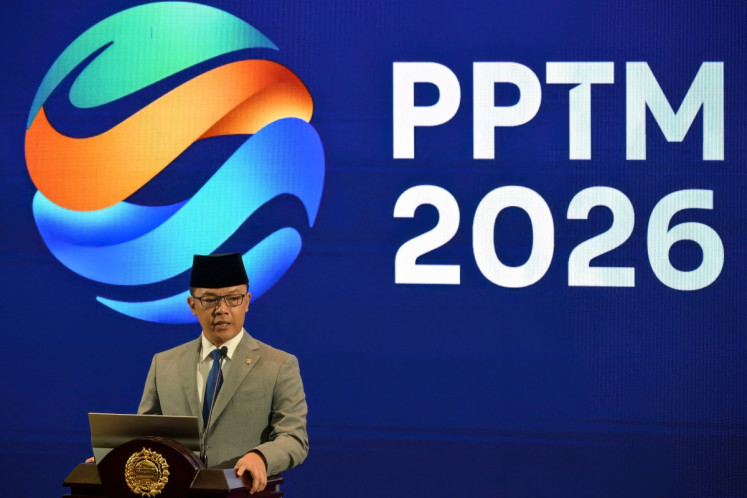Popular Reads
Top Results
Can't find what you're looking for?
View all search resultsPopular Reads
Top Results
Can't find what you're looking for?
View all search resultsJapan PM expresses WWII remorse, but says next generation need not apologize
Japanese Prime Minister Shinzo Abe looks down as he delivers a war anniversary statement that neighbouring nations will scrutinise for signs of sufficient remorse over Tokyo's past militarism at his official residence in Tokyo on August 14, 2015
Change text size
Gift Premium Articles
to Anyone
J
span class="caption">Japanese Prime Minister Shinzo Abe looks down as he delivers a war anniversary statement that neighbouring nations will scrutinise for signs of sufficient remorse over Tokyo's past militarism at his official residence in Tokyo on August 14, 2015. (AFP/Toru Yamanaka)
Japanese Prime Minister Shinzo Abe expressed deep remorse Friday over World War II and said previous national apologies were unshakeable, but emphasized future generations should not have to keep saying sorry.
In a closely watched speech a day ahead of the 70th anniversary of the end of WWII, the nationalist premier appeared to tread a fine line between regret over Japanese wartime aggression while also focusing on what his pacifist country had done since the end of the conflict.
"Japan has repeatedly expressed feelings of deep remorse and heartfelt apology for its actions during the war.... we have consistently devoted ourselves to the peace and prosperity of the region since the end of the war," Abe said.
"Such position(s) articulated by the previous cabinets will remain unshakable into the future."
When speaking about China, which suffered from Japan's imperial march across Asia, Abe referred to "unbearable sufferings caused by the Japanese military".
Referring to those who perished in the war, Abe expressed "profound grief and my eternal, sincere condolences".
He added that we have "engraved in our hearts" the suffering of Asian neighbors, including South Korea, Indonesia, the Philippines and Taiwan.
But he added later that future generations of Japanese should not have to continually apologize.
"We must not let our children, grandchildren and even further generations to come, who have nothing to do with that war, be predestined to apologize," he said.
China and South Korea had previously made clear they wanted Abe to stick to explicit prime ministerial apologies. They did not give immediate reactions to Abe's speech on Friday.
China says more than 20 million of its citizens died as a result of Japan's invasion, occupation and atrocities, while Tokyo colonized the Korean peninsula for 35 years until 1945.
Japan's wartime history has come under a renewed focus since Abe swept to power in late 2012.
The 60-year-old has been criticized by some for playing down Japan's past and trying to expand the role of the military.
The statement has been top news in Japan as media outlets speculated on whether Abe would follow a landmark 1995 statement issued by then-premier Tomiichi Murayama.
The so-called Murayama Statement, which became a benchmark for subsequent apologies, expressed "deep remorse" and a "heartfelt apology" for the "tremendous damage" inflicted, particularly in Asia.
Abe has raised concerns with his Asian neighbors with previous comments about the need for a "forward-looking attitude" that concentrated on the positive role his country had played in Asia in the post-war years.
He had also made waves by quibbling over the definition of "invade", and provoked anger by downplaying Tokyo's formalized system of sex slavery in military brothels.
A 2013 visit to Yasukuni Shrine -- seen by Japan's neighbors as a potent symbol of its militarist past -- sent relations with Beijing and Seoul to their lowest point in decades, aggravating long-running territorial disputes.
While Abe's nationalism tends to be popular on the political right, Japan's own national self-narrative has over the decades been one more of victim of the US atomic bombings and a war-mongering government, rather than colonialist aggressor largely responsible for an ill-fated Pacific conflict.
Unlike in Germany, there has been little in the way of a national reckoning.
Emperor Hirohito, who was seen as god-like figure, died in 1989 without answering to his own responsibility over a war fought in his name.
This sharply contrasted with the blame heaped on Adolf Hitler and the Nazis.
German chancellor Angela Merkel waded into the fraught subject of wartime forgiveness during a visit to Japan in March, saying that "facing history squarely" and "generous gestures" were necessary to mend ties.
A poll published in the Mainichi newspaper on Friday found 47 percent of those surveyed thought Japan's involvement in WWII was "wrong" because it was an invasion.
It also said 44 percent of respondents thought Japan had apologized enough over the war, while 31 percent thought it had not.
Thirteen percent believed Japan had no reason to apologize in the first place.(+++)










